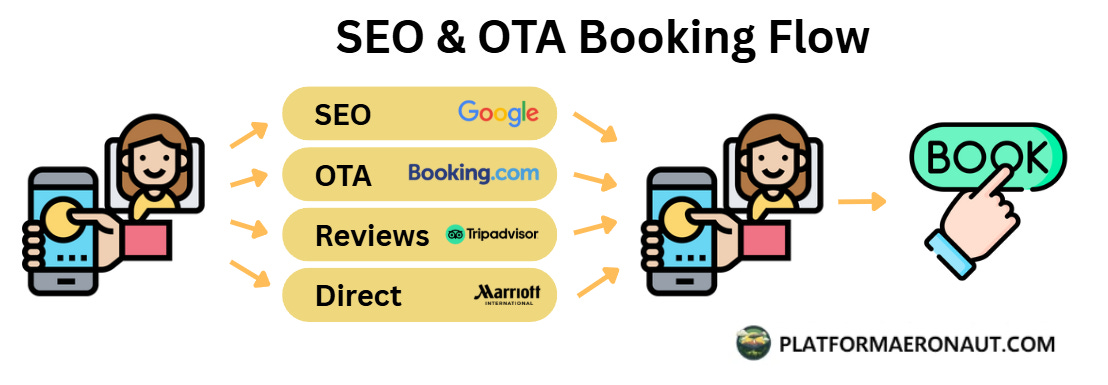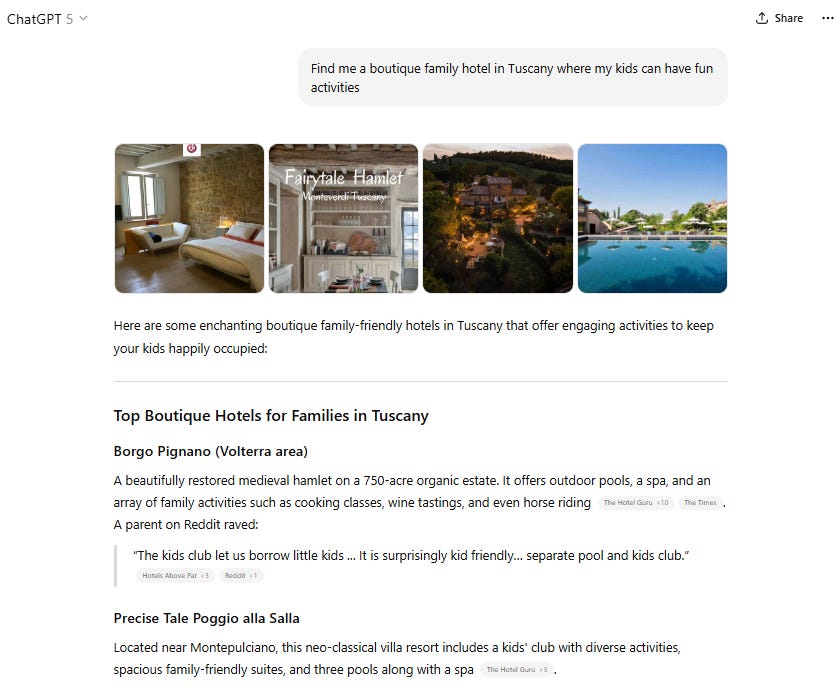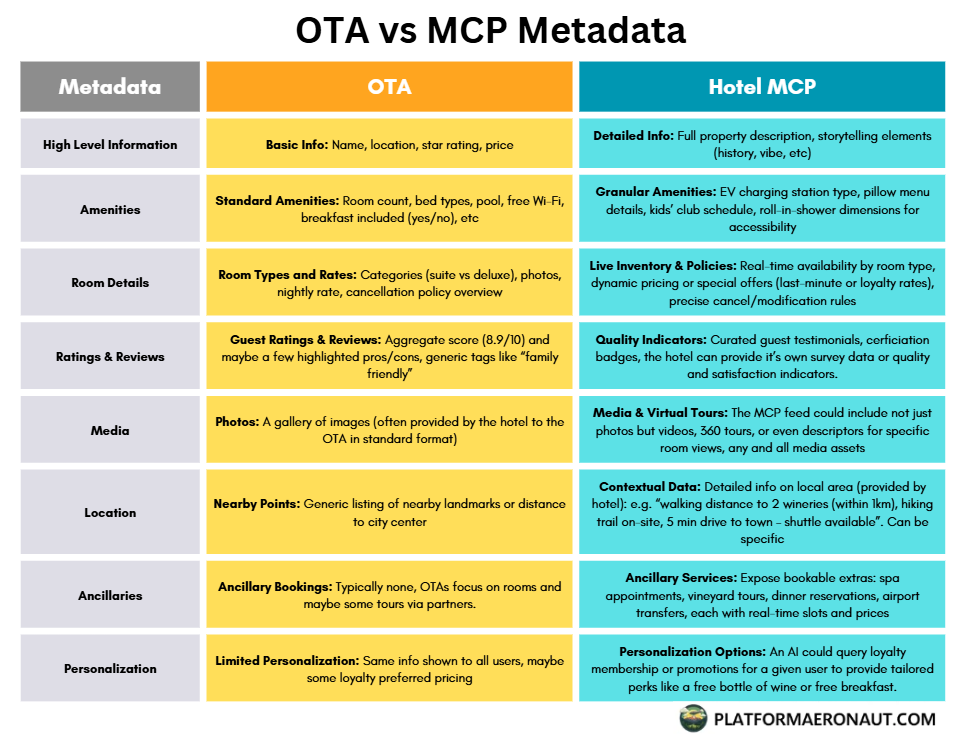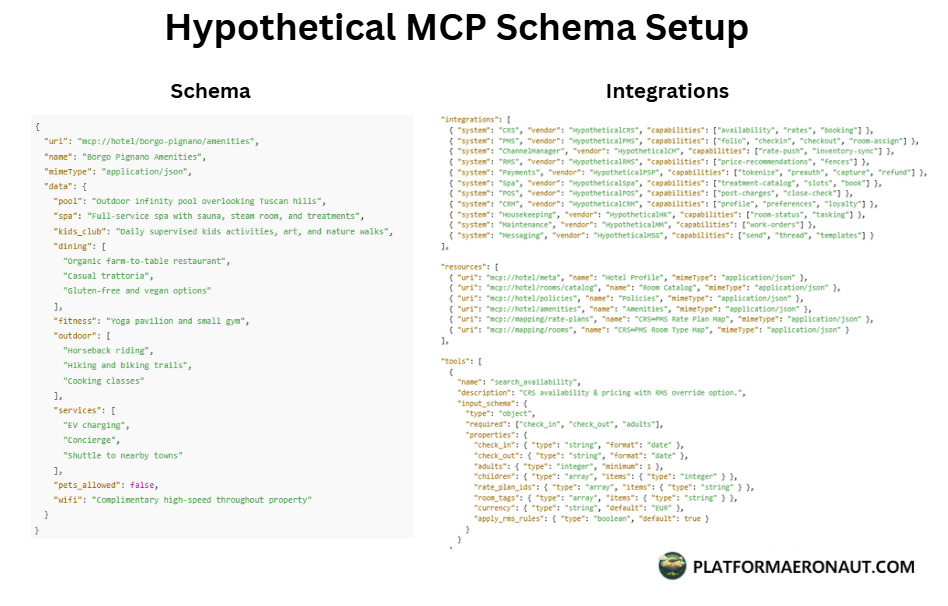How Hotels Can Thrive in an Agentic AI World: From SEO to MCP
AI assistants are reshaping how travelers discover and book hotels. Hotels can reclaim visibility, bookings, and guest ownership with AI-readable data through Model Context Protocol (MCP)
With the launch of GPT 5, operator, and a slew of Agentic AI tools, the age of booking a hotel or flight with an AI Agent is upon us. For the consumer it accelerates the ability to digest information, discover, and book hotels, but what about from the perspective of the hotel operator?
Past: Complex Human Centric Flow
Today, when a user has the idea of a “family-friendly boutique hotel in Tuscany under $500 a night with vineyard views” it’s a complex human-centric project. You might start with Google with that query, click around for reviews, blogs, hotel websites, OTA listings, and amalgamate that information into an idea of where you’d like to stay for your vacation. It’s tried and true but inefficient and subject to SEO and OTA reliance. Enter the world of AI Agents and explosive use of ChatGPT, what does it look like.
Today: ChatGPT Discovery and Query
The entrance of ChatGPT and LLM chat has enabled the consumer to be 100x more efficient when discovering and booking travel. As opposed to spending hours researching manually, the LLM parses down the information into a digestible and easy format for the consumer to make a decision.
Future: Agentic AI
But what about in a world where you have a personalized agent that you want to actually do the booking? What about when you have super detailed requirements or questions to help you decide. I’ve discussed the AI future of travel before when it comes to voice, but this is a much more complex problem to solve.
Pain Points Today for Consumers
Any ChatGPT power user soon realizes the imperfection of ChatGPT when it comes to travel. Verifying that the hotel recommendations do in fact have a kids club or whether the Deluxe King Suite actually has Sea Views is a minefield of incorrect information. The trust level and accuracy level isn’t high enough for me to trust a true agentic AI agent to take over and handle everything for me yet. So what is the solution?
Pain Points Today for Hotels
And with the rise of ChatGPT it creates tons of complexity for hotel operators. SEO traffic is significantly down, there’s risk of commoditization and the funneling of AI traffic to the top hotels and destinations, your information may be inaccurate or out of date based on a blog from a decade ago, and customer service gaps exist when a consumer wants to know whether you have late check-out, EV chargers, or whether the pool is heated.
We’ve seen the first step with the rise of ChatGPT has been a solidification of OTAs with Booking.com highlighted in OpenAI Operator and Expedia testing out plugins. But is an OTA-first world best for consumers and hotel operators? How does this actually develop over time?
The Solution: Model Context Protocol (MCP) for Travel
Enter MCP, the “USB-C of AI Agents”: The Model Context Protocol (MCP) is a newly emerged solution for the data disconnection. It’s an open standard that lets AI assistants plug into external data sources and tools in a universal, secure way. Every request and response follows the same JSON format, so an AI agent can discover what tools (data, API endpoints) a hotel exposes and use them immediately. In practice, MCP gives AI agents a consistent method to query databases, ask questions of proprietary systems, and even execute transactions without custom-build integrations.
For hotels imagine turning all of the APIs and data feeds that hotels and travel supplies already have (Expedia EPS, HotelBeds, PMS, booking engines) into callable tools than an AI like ChatGPT can use in real time. Today ChatGPT often gives back quasi-accurate or generic information about a specific hotel, but with an MCP ChatGPT can literally ask your system “Do you have a one bedroom suite with an ocean view available on August 30th under $500?”, and get a structured answer back from a hotels inventory in real time.
Most importantly it isn’t limited to search queries. It can expose almost any functionality or data you choose. This means with an MCP an AI agent can book a stay, cancel or modify a reservation, offer concierge services, check loyalty points, book ancillary services like a massage or local tour, and answer detailed questions.
Why this Matters for Hotels
In the old days of SEO, your website was your digital storefront. In the OTA era your OTA listing page became just as critical. In the AI era your “landing page” is effectively your structured data schema or the machine-readable profile of your hotel that AI agents will consult. Without AI-friendly data feeds, your hotel might simply not show up in tomorrow’s AI-driven search results.
We’ve already seen solutions like Lighthouse’s Connect AI pop up that help to bridge the divide between hotels and AI-powered travel planning. With the advent of the internet the average hotel went from an active participant in the marketplace to a passive participant with the rise of OTAs. MCP integration can enable a hotel to become an active participant again as opposed to a database entry in somebody else’s system.
The Bottom Line: MCP gives hotels a way to reclaim visibility and direct interaction in an AI-driven world.
Scenario: A Boutique Hotel Operator Past, Now, Future
To illustrate the impact of this shift let’s walk through a hypothetical scenario for a boutique independent hotel in Tuscany with family focused amenities. I’ll use Borgo Pignano in Volterra to illustrate this because 1) I’ve been there, and 2) famed VC Michael Moritz owns it and that’s entertaining. I’ll explore how it’s distribution and guest interactions happened in the past, what’s happening today, and what could happen in the future with MCP adoption
Past (SEO/OTA Era)
Our hotel historically has largely thrived through Google Search and OTA listings. Perhaps 40% of our web traffic and a good chunk of bookings can from organic search results. Travelers googling “Tuscany boutique vineyard hotel” would find Borgo Pignano’s website or a travel blog talking about the experience. Our investment in content and SEO gave us a great Google ranking, but 60% of our bookings still come from an OTA like Booking or Expedia.
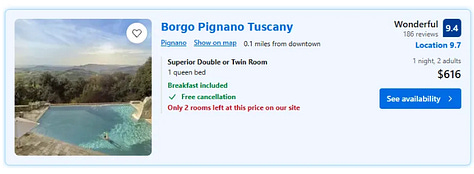
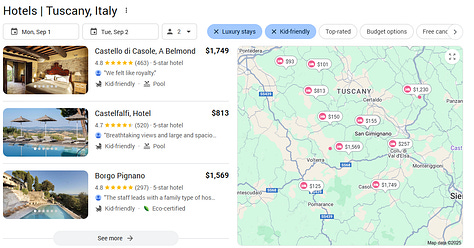
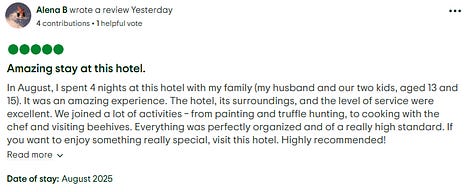
Potential visitors read through our TripAdvisor reviews and see we’re a “Top Family Hotel in Tuscany”, they visit our website to look at pictures and amenities, and they price compare with the OTAs and eventually decide to book with Booking because of the Genius loyalty program. We have a solid business but because consumers trust the OTAs and like comparison shopping I can’t move the needle on my direct<>OTA share and have to pay 20% commission on 60% of my business to an OTA.
Today (AI Assistant Era, No MCP)
Now in 2025 imagine a traveler asks ChatGPT “Find me a boutique family hotel in Tuscany where my kids can have fun activities.”
Look, this query put Borgo Pignano as the top result, that’s awesome! It even has a great summary and tag-line and mentions activities like wine tastings, cooking classes, and the spa. At first glance it feels like it’s much better than using an OTA and that it has detailed and helpful information. But what the LLM query has done in reality is just condense publicly available information from crawling the web. It’s simplified the past era into a magic box as opposed to exposed any new information.
From an operational view, if the traveler’s AI asks about late checkout, or EV chargers, or other small details and the AI responds with generic details or information gaps it can erode guest confidence in booking our property.
Today without MCP, our boutique hotel is at the mercy of whatever sparse data AI platforms can scrape together. Where we stand today it’s likely that AI agents will lean towards channels that do interact with them (like OTAs) so direct bookings to our property may dwindle further. The strengths of our property are largely invisible in this new paradigm.
Future (AI Assistant + Hotel MCP)
Now imagine Borgo Pignano steps up and implements an MCP server and integration for its systems. Essentially the hotel will create a structured “AI Feed” describing it’s offerings and tools that allow AI agents to transact and interact with it.
When a traveler’s AI asks the same question about a family-friendly boutique hotel in Tuscany, Borgo Pignano’s MCP-exposed data ensures the AI receives a rich profile of the property straight from the source. It can enable a vivid narrative with high definition photos and down the line potentially even personalized offers for pricing, amenities, and add-ons.
Our hotel has regained control over it’s storytelling as opposed to relying on fixed OTA metadata or SEO from TripAdvisor, Reddit, or blogs. Our brand voice can speak through the AI rather than being drowned out by OTA boilerplate.
Enabling Actions: Crucially the AI can also perform actions via MCP. In the conversation when the guest says “That sounds great, please book it.” the AI can invoke Borgo Pignano’s booking engine through the MCP, check live availability via the PMS, lock in the reservation, and confirm or guarantee specific requests. The booking is made directly with the hotel and can even enable perks like “Booking direct will include free breakfast which I’ve applied as a perk”. No OTA commission is taken and the guest’s information goes straight into the hotel’s database systems.
Post Booking Services: Suppose our guest’s flight is delayed and they inform their AI assistant. In the MCP future the AI could proactively contact Borgo Pignano’s system via the MCP to shift the check-in time or offer an airport pickup. Borgo Pignano’s AI agent may even proactively offer to upsell a discounted spa treatment knowing they’ll be tired after a long flight. MCP enables high-touch and personalized service at scale because utilizing the MCP the AI can transact in real-time.
Personalized AI Customer Service Agent: Once data and operations are accessible via MCP you can power an AI concierge or chatbot that’s far more capable than old FAQ bots. It could extend stays for guests, confirm vegan breakfast options, manage questions, reservations, and preferences, and do it all 24/7 automatically.
Loyalty & Direct Perks: With an MCP you can explicitly expose and program perks for guests with loyalty membership or who book directly and the AI Agent will know to present those benefits. If a guest with Gold membership is querying the MCP system can respond with “loyalty_status=Gold: offer free room upgrade if available; 4pm late checkout; welcome gift included.” This enables independent hotels to fight back against OTAs on value and let AI dynamically tailor the guests experience based on existing data in your CRM/PMS.
Operational Automation: MCP isn’t just about guest-facing AI, it also enables internal automation and integrations. Imagine arrival disruptions or a restaurant closure where previously it would require a staff member manually calling to re-confirm or re-schedule reservations. With your data exposed through an MCP and with in-house AI agents that can all be automated on the back-end. Additionally think of marketing personalization, accounting/financials, and maintenance being better planned, executed, and automated.
In short, MCP can let a small boutique hotel scale hospitality through AI while maintaining control. It does this by using the MCP on top of it’s existing data systems to provide rich data, collect direct bookings, and deliver automated but personalized service. Guests get convenience without losing the charm and detail of a boutique experience.
OTA Metadata vs a Custom MCP Feed
It’s worth digging into how the data is provided via OTAs today versus what a hotel could provide via it’s own MCP enabled feed. While the OTAs have extensive databases, the nature of their business forces standardization and limitations on information to what’s broadly useful. A custom MCP feed lets a hotel go much deeper and highlight what makes it unique.
The OTA data is useful for basic filtering and comparison, but it flattens hotels into very specific data fields, while an MCP lets a hotel break out of that mold. Expedia’s APIs do include a lot of information, but by the nature of their business across thousands of properties they have to generalize a lot and they often lose niche attributes.
Does your hotel have a famous library of local history books? Is the included breakfast just continental or is there an on-premises chef that cooks breakfast to order? Is the garden tour in the afternoon self guided or with the chef de cuisine of the restaurant? Is the airport pickup done by a third party or in hotel-owned vehicles? Does the airport pickup van have a car seat for a child? All of these can be exposures and provided through an MCP in a way that is AI-native.
By a hotel establishing it’s own schema it ensures no detail is lost. Mews and Apaleo are integrating and allowing MCP layers on top to allow agents from ChatGPT to instantly pull tomorrow’s VIP arrivals and format briefings though standardized calls. Hotel AI agents are being enabled to automatically handle late check-out requests (something an OTA could never do on it’s own).
What the Schema Looks Like
At a super high level the schema is reasonably understandable for the lay-person. It’s the digitalization of all of your data in a standardized format.
This may not seem revolutionary versus an OTA metadata snippet, but acting as a source of trust and truth for an AI agent puts the hotel MCP at the top of the stack for responding to queries and enables agentic action. An MCP isn’t just about structured data, it’s about source-verified, real-time information.
Who Will Provide MCPs?
Implementing an MCP sounds daunting, especially for independent hotels but the ecosystem is evolving super fast to make it accessible. The other question is who has the right to win here?
Existing Tech Vendors: PMS, CRS, channel managers and other vendors (like Cloudbeds, Mews, SiteMinder, and Apaleo) will rapidly integrate MCP servers into their existing offerings. It makes sense because that’s where a lot of the data sits and the right to win for MCP I think will be closer to the underlying data itself.
In-House Development: Larger brands like Marriott or Hyatt will build their own AI integration layers and proprietary MCPs. Marriott is already experimenting with AI concierge services and loyalty integrations and they’ll 100% do it themselves to maintain ownership over their data.
New Startups: If the existing vendors are slow or can’t make the AI jump we will see new AI-native startups proliferate to provide MCP services to hoteliers. There’s potentially a big first mover advantage for the hotels themselves to capture AI generated demand. If my PMS doesn’t offer it I will find a startup who can help me execute this. It’s back to the 90’s when hotels launched individual websites. Those who lead tech-first will capture share and this demand for AI nativity will create new startup winners in the MCP category. Players today include Kismet, DirectBooker, and Agentic Hospitality.
Who Won’t Win or Won’t Play?
I don’t expect the LLM model companies like OpenAI to play a big role here. They certainly will help establish standards, but given how removed they are from the internal tech stack at a hotel operator, I doubt they move into MCP server services.
And although it may be controversial, I don’t think the OTAs will win at MCP for individual hotels. It’s not in their strategic interest to make sure the consumer gets the absolute best knowledge about Borgo Pignano vs the 10 other options. That consumer confusion and information asymmetry is a strategic advantage for the OTAs and the AI first MCP enabled world hurts that moat.
From SEO to MCP: Embracing the Agentic AI Future
The hospitality industry has undergone distribution revolutions before with the rise of websites and SEO to the dominance of OTAs and meta-search. We’re now entering the next phase: the age of AI agents. Overall the shift can be summarized as SEO → OTA → MCP. In the SEO era you competed for keywords on Google. In the OTA era you competed for visibility and rankings on aggregator platforms. In the coming MCP era you will compete on data and connectivity in the AI domain.
This is a huge opportunity for boutique and independent hotels to level the playing field. Agentic AI doesn’t have to result in more commoditization. If you can successfully feed AI agents the rich and personalized information you have as a hotel it can surface it to consumers in a more nuanced way than SEO or OTAs ever did.
Tickers Mentioned: BKNG 0.00%↑ EXPE 0.00%↑ ABNB 0.00%↑ MSFT 0.00%↑ TRIP 0.00%↑ TRVG 0.00%↑ MAR 0.00%↑ H 0.00%↑ HLT 0.00%↑ GOOGL 0.00%↑
Resources:
Apaleo: API-first, AI agents, and MCP: The new building blocks of hospitality innovation
Former Heads of Google Travel and Tripadvisor Form AI Startup to Head Off Online Travel Agencies
The information presented in this newsletter is the opinion of the author and does not reflect the view of any other person or entity, including Altimeter Capital Management, LP ("Altimeter"). The information provided is believed to be from reliable sources but no liability is accepted for any inaccuracies. This is for informational purposes and should not be construed as investment advice or an investment recommendation. Past performance is no guarantee of future performance. Altimeter is an investment adviser registered with the U.S. Securities and Exchange Commission. Registration does not imply a certain level of skill or training. Altimeter and its clients trade in public securities and have made and/or may make investments in or investment decisions relating to the companies referenced herein. The views expressed herein are those of the author and not of Altimeter or its clients, which reserve the right to make investment decisions or engage in trading activity that would be (or could be construed as) consistent and/or inconsistent with the views expressed herein.
This post and the information presented are intended for informational purposes only. The views expressed herein are the author’s alone and do not constitute an offer to sell, or a recommendation to purchase, or a solicitation of an offer to buy, any security, nor a recommendation for any investment product or service. While certain information contained herein has been obtained from sources believed to be reliable, neither the author nor any of his employers or their affiliates have independently verified this information, and its accuracy and completeness cannot be guaranteed. Accordingly, no representation or warranty, express or implied, is made as to, and no reliance should be placed on, the fairness, accuracy, timeliness or completeness of this information. The author and all employers and their affiliated persons assume no liability for this information and no obligation to update the information or analysis contained herein in the future.


